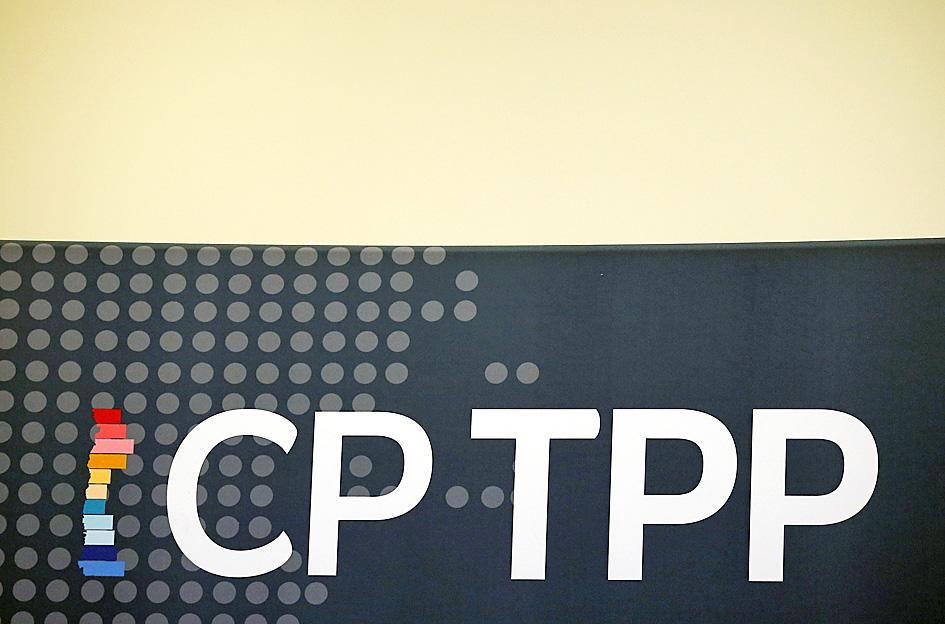The US could invoke a clause in its trade agreement with Canada and Mexico to block China’s application to join the Comprehensive and Progressive Agreement for Trans-Pacific Partnership (CPTPP), a government official said yesterday.
Under Article 32.10 of the Exceptions and General Provisions of the United States-Mexico-Canada Agreement (USMCA), if either Canada or Mexico enter a free-trade agreement with a nonmarket economy — such as China — the US could withdraw from the agreement.
“If that clause applies to multilateral free-trade agreements such as the CPTPP — which Mexico and Canada are members of — that might be cause for the two countries to oppose China’s membership,” a senior Executive Yuan official said on condition of anonymity.

Photo: Reuters
Echoing an assertion made in an analysis by The Diplomat editor-in-chief Shannon Tiezzi on Friday, the source said that China might see CPTPP membership as a means of circumventing trade restrictions imposed by the US in an ongoing US-China trade dispute.
“However, China is an authoritarian regime that lacks transparency, and its laws and market systems are far removed from those of existing CPTPP members,” the source said. “We will have to wait to see exactly what its intentions are.”
The USMCA was introduced in January last year to replace the North American Free Trade Agreement, which had been in place since 1994.
Although the USMCA was signed by former US president Donald Trump, who took a tough stance on China-related issues, US President Joe Biden has not deviated from that position, the source said, adding that the world was waiting to see how the Biden administration would react to China’s CPTPP application.
“China engages in market interference through its state-owned enterprises — that is contrary to how a free-market economy should work,” the source said. “Many CPTPP members have expressed reservations about whether China can meet the agreement’s standards.”
Separately yesterday, National Medical University liberal arts professor Chang Kuo-cheng (張國城) said that concerns that China’s CPTPP bid would affect Taiwan’s own aspirations for membership were unfounded.
Joining the agreement would not be easy for China, and would require approval from all members, he said.
Nevertheless, China’s large economy and political resources would work in its favor in attempting to join, he added.
Additional reporting by Wu Su-wei

Taiwan is to receive the first batch of Lockheed Martin F-16 Block 70 jets from the US late this month, a defense official said yesterday, after a year-long delay due to a logjam in US arms deliveries. Completing the NT$247.2 billion (US$7.69 billion) arms deal for 66 jets would make Taiwan the third nation in the world to receive factory-fresh advanced fighter jets of the same make and model, following Bahrain and Slovakia, the official said on condition of anonymity. F-16 Block 70/72 are newly manufactured F-16 jets built by Lockheed Martin to the standards of the F-16V upgrade package. Republic of China

Taiwan-Japan Travel Passes are available for use on public transit networks in the two countries, Taoyuan Metro Corp said yesterday, adding that discounts of up to 7 percent are available. Taoyuan Metro, the Taipei MRT and Japan’s Keisei Electric Railway teamed up to develop the pass. Taoyuan Metro operates the Taiwan Taoyuan International Airport MRT Line, while Keisei Electric Railway offers express services between Tokyo’s Narita Airport, and the Keisei Ueno and Nippori stations in the Japanese capital, as well as between Narita and Haneda airports. The basic package comprises one one-way ticket on the Taoyuan MRT Line and one Skyliner ticket on

Starlux Airlines, Taiwan’s newest international carrier, has announced it would apply to join the Oneworld global airline alliance before the end of next year. In an investor conference on Monday, Starlux Airlines chief executive officer Glenn Chai (翟健華) said joining the alliance would help it access Taiwan. Chai said that if accepted, Starlux would work with other airlines in the alliance on flight schedules, passenger transits and frequent flyer programs. The Oneworld alliance has 13 members, including American Airlines, British Airways, Cathay Pacific and Qantas, and serves more than 900 destinations in 170 territories. Joining Oneworld would also help boost

A new tropical storm formed late yesterday near Guam and is to approach closest to Taiwan on Thursday, the Central Weather Administration (CWA) said. Tropical Storm Pulasan became the 14th named storm of the year at 9:25pm yesterday, the agency said. As of 8am today, it was near Guam traveling northwest at 21kph, it said. The storm’s structure is relatively loose and conditions for strengthening are limited, WeatherRisk analyst Wu Sheng-yu (吳聖宇) said on Facebook. Its path is likely to be similar to Typhoon Bebinca, which passed north of Taiwan over Japan’s Ryukyu Islands and made landfall in Shanghai this morning, he said. However, it